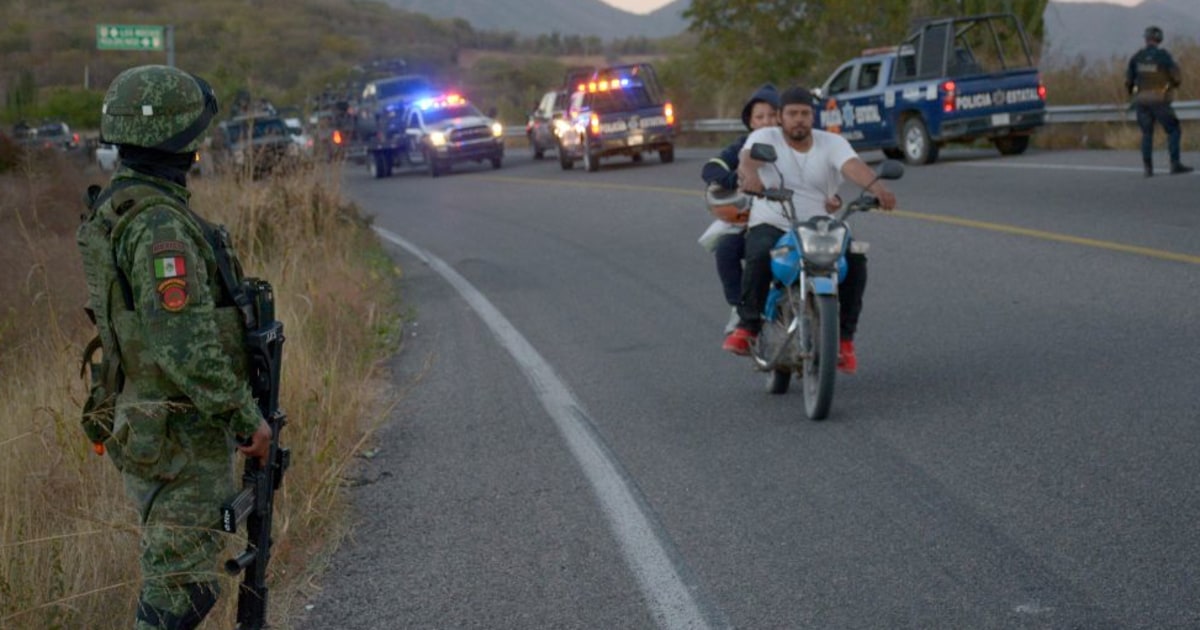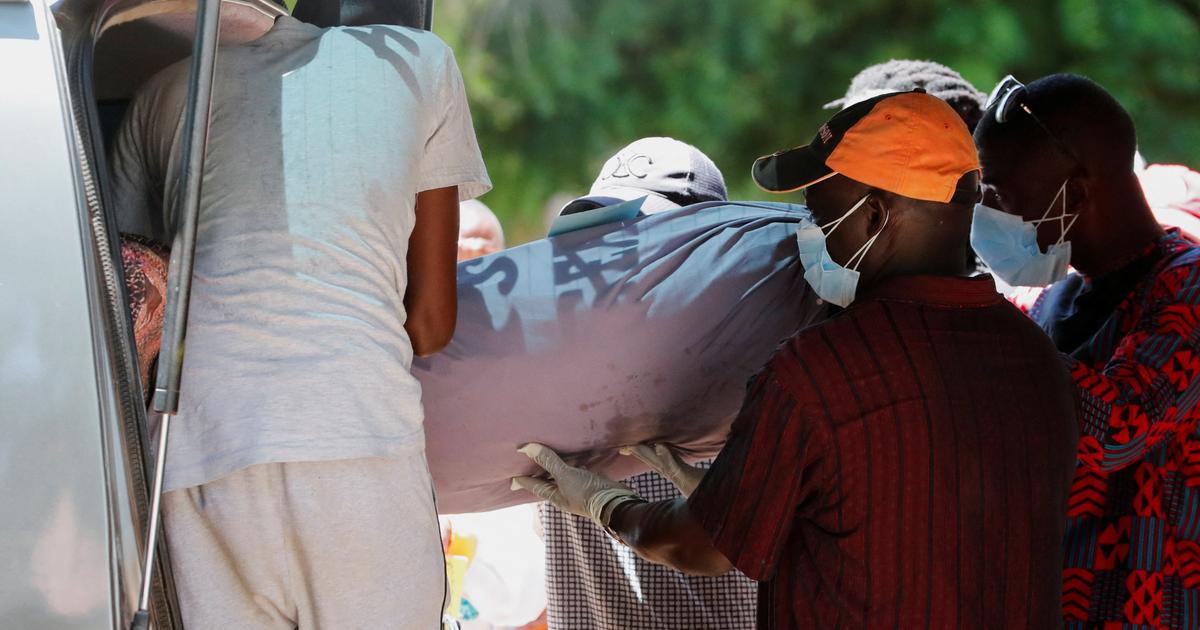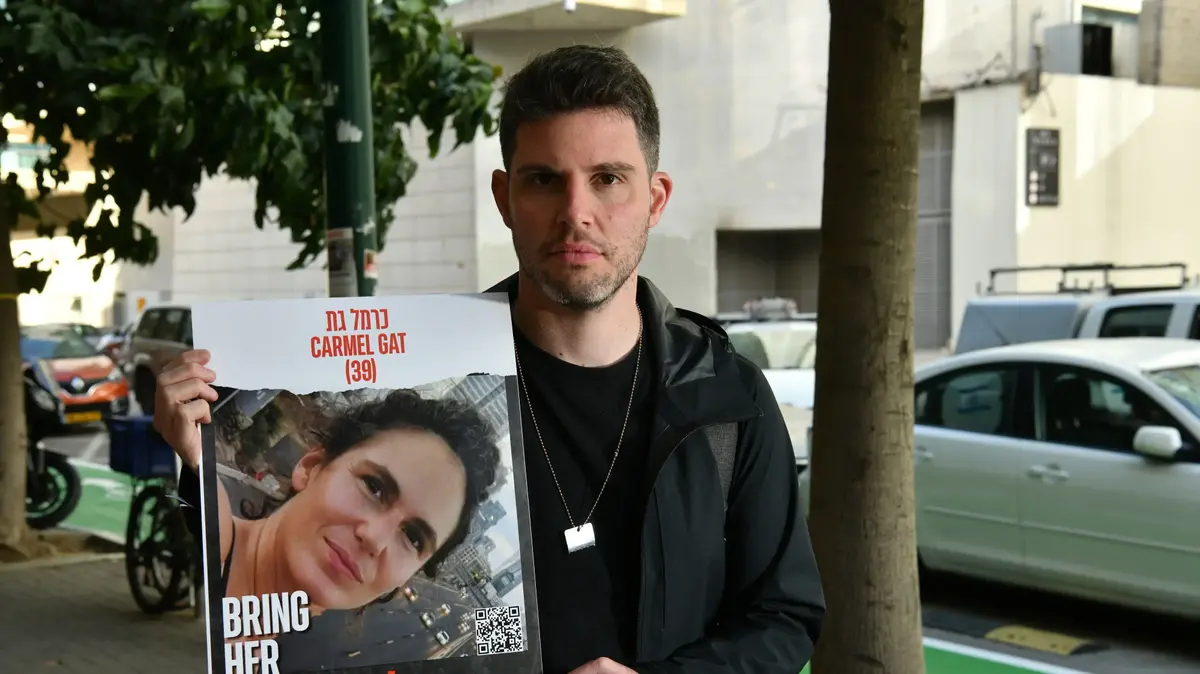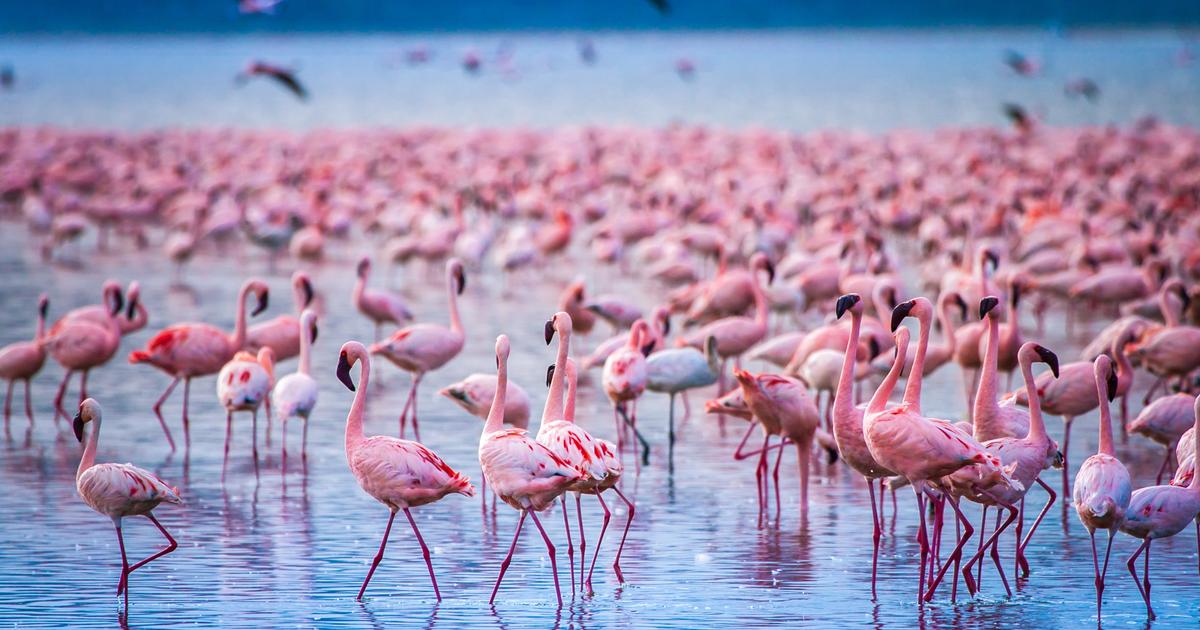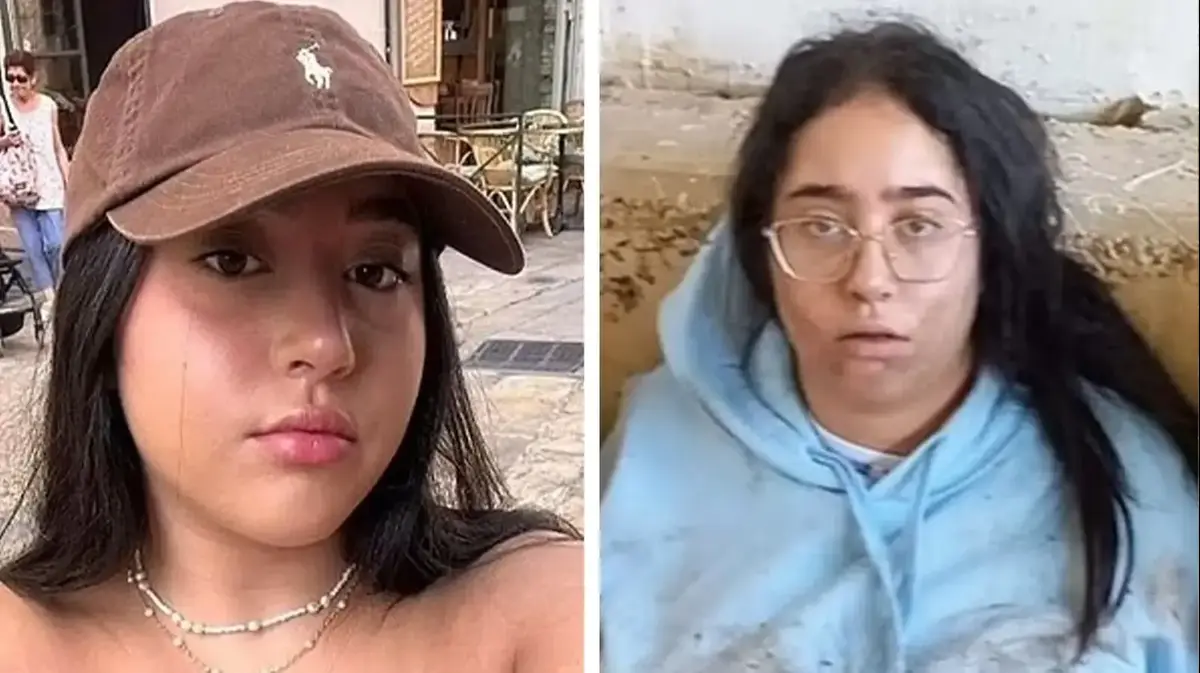Enlarge image
Images from a surveillance camera: a woman leads the way with another child (left), Joy walks behind, hopping, (right)
Photo: surveillance camera
She looks happy in the pictures, even if she can only be recognized for a split second. Joy is wearing a pink skirt, hopping she apparently follows a woman and two other children, then she disappears from the point of view of the surveillance camera. Another camera records the apparently same group again shortly afterwards, after which every trace is lost. Three-year-old Joy is missing. The pictures from the cameras are now almost seven weeks old and the girl has been lost.
"I pray every day that she will come back," says Joy's mother, Mary Wanjiku. The images from the surveillance cameras are saved on her cell phone, and she looks at them over and over again. "If at least someone were to ask for a ransom, as in other cases, then maybe I could get it and she would come back," she sobs. She assumes a kidnapping, but to this day the possible perpetrators have not contacted her.
Wanjiku is not alone in her suffering: The Kenyan media speak of a real »wave of kidnappings«. A few days ago, a new case caused horror: A young man confessed to the murder of more than ten children, and in at least two cases he tried to extort ransom from relatives. The investigative agency DCI named the perpetrator "vampire" and "beast" in a series of tweets because he allegedly drank the blood of his victims. It sounds like a crazy individual case, the isolated act of a madman, but unfortunately it's not that simple.
"In the past few weeks, the number of child abductions has increased significantly," says security expert Adam Lakhani. He is the chief analyst of the Kenyan company Salama Fikira, which among other things advises international organizations on the security situation. In a current dossier, Lakhani describes the risk level as high. “What is particularly remarkable is that the perpetrators look for their victims in lively areas, not in expensive neighborhoods. The ransom demands are often less than $ 1,000. I suspect that the increased poverty caused by the corona pandemic is behind it, ”says Lakhani. "Any form of income, including from illegal activities, seems very tempting to many."
In Nigeria, West Africa, kidnappings of children have been making headlines for some time, sometimes entire school classes are being abducted. Often there are Islamist fighters behind it, sometimes also criminal gangs, it is not always possible to draw a clear line between these groups. Some experts assume that the pandemic-induced poverty has also led to an increase in the number of cases.
In Kenya, the perpetrators often do not act very professionally. The case of eight-year-old Shantel is a tragic example: According to the police, her alleged kidnapper tried to lure two children into a trap, but the other girl refused and was later able to identify the main suspect. But for Shantel, any help came too late. According to the autopsy report, she suffocated from the gagging of her mouth and nose, and her body was discovered in a sack two days after the abduction. The main suspect Nativity N. was unemployed, according to her neighbors - the kiosk she ran was closed during the pandemic. She had demanded the equivalent of 2,300 euros in ransom from Shantel's mother.
Even the UN children's aid organization Unicef felt compelled to publish a statement on the rampant kidnappings in the East African country at the end of last week, in an unusually sharp tone: It was "one of the worst crimes one can imagine", the efforts to protect the Children would have to be doubled. A demand that is unequivocally addressed to the Kenyan government. Because many relatives feel so far left quite alone with this "worst crime". And so those affected are now mainly helping themselves.
Mary Wanjiku also said she initially went to the police and reported the alleged kidnapping of her daughter Joy.
But the investigators didn't even look at the crime scene, she says.
The pictures from the surveillance cameras, they didn't get them from the police.
Wanjiku ran out of the neighborhood herself, she said, looked for cameras and asked the owners for the video material.
“I then handed it over to the police, but they just said: That wasn't convincing.
It's like they don't care, ”recalls the mother.
The relatives investigate themselves
Wanjiku not only found the surveillance videos, but also interviewed witnesses himself. “Other children have told me that a strange woman lured my daughter out of the courtyard of our house. Apparently she promised her to buy sweets, ”reports the mother. Wanjiku has put up search posters all over the neighborhood, so far without success: “When I read on the news that a child has been released by kidnappers or freed by the police, I get hope. I pray it will be my daughter next time. ”The police have not yet been reached for comment.
Kenyan media report that numerous children have also disappeared without a trace in the neighboring Zimmerman district in recent weeks. The parents concerned are concerned that they have been kidnapped. What happens to the victims remains unclear, and human trafficking is also flourishing in the East African country. Some suspect it will be sold to couples willing to adopt, and according to the DCI investigating agency, more and more girls are becoming victims of sexual exploitation. Often these are just guesses. In the meantime, an investigative task force has been set up to deal with the kidnappings.
Yet few believe that big breakthroughs are to be expected. Especially in the poorer parts of the city, the clearing-up rate of crimes is extremely low anyway. And affluent victims would rather hire private detectives than wait for results from the police. Those who cannot afford that are determined like Mary Wanjiku herself. Digital technologies are becoming more and more important.
The search poster of the missing Joy is now circulating on Facebook, Twitter and in numerous WhatsApp groups. Because her mother turned on the organization Missing Child Kenya (MCK), which specializes in digital search campaigns. New search requests are published almost every day, and it is often the last hope for parents. MCK processed 242 cases in the past year, and 147 children were found alive. »We rely on the online community, with whose help we can find children in the shortest possible time. Thanks to this search via social media and WhatsApp, a process that could otherwise take weeks or months is shortened to an average of three days, ”says MCK chairwoman Jennifer Kaberi.
And so social media has also become a weapon in the fight against kidnappings. A weapon that Wasioma Bashir also used. At the beginning of July he was sitting on a bus when he noticed a loudly crying child a few rows in front of him. Tried to run away from a woman. “Then I went to the woman and asked her if everything was okay. She said the child was just bitching. But I didn't believe her, mainly because of the increasing number of kidnappings, ”recalls Bashir.
So he pulled out his cell phone, recorded a video of the crying child and posted it on Twitter, with the request to find the real mother. The recordings went viral within a few minutes and were shared thousands of times. In a very short time, massive public pressure built up, the alleged perpetrator was taken to a police station. In the end, however, the case turned out to be harmless, the accused was the child's aunt. The line between initiative and vigilante justice can sometimes be blurred in a country where hardly anyone relies on the police.
In the Eastleigh district, too, some residents are taking the fight against the wave of kidnappings into their own hands. The quarter is particularly badly affected, it is one of the most densely populated areas in the country. Here, the kidnappers apparently easily get to potential victims, and children often play together on the street without supervision. Several adults were kidnapped here in broad daylight.
The case of a young businesswoman who was kidnapped by kidnappers made national headlines in June. The perpetrators forced her to record a video. Her face contorted with pain, disfigured by obvious torture, she appealed to her relatives to pay the ransom. Investigators finally found the young woman locked in an old water tank. The perpetrators were later caught; they had bought a pub outside the capital from their booty.
“There is an increase in kidnapping cases. I want you all to be very careful, ”warns Aisha Hamisi with a raised index finger. About a dozen children from the neighborhood sit and stand in front of her, as well as a few mothers. The activist is currently roaming the neighborhood to inform about the kidnappings and also goes to schools. "Many lost their jobs as a result of the corona crisis, and the number of kidnappings has increased since then," she says. She wants to raise awareness among parents and children with awareness-raising campaigns: »Do not take sweets from strangers. Goes the direct way home. "
Many mothers and fathers have already adapted their everyday lives.
“My child used to take a motorcycle taxi home from school, but now I pick it up myself.
Because you never know who's in cahoots with the kidnappers, ”says a mother.
The distrust of one another has also grown.
Mary Wanjiku, the mother of the missing Joy, has not yet received any promising information about the whereabouts of her younger child.
But she doesn't give up.
She looks again at the surveillance video, at the last short recordings of her daughter.
This contribution is part of the Global Society project
Expand areaWhat is the Global Society project?
Reporters from
Asia, Africa, Latin America and Europe
report under the title “Global Society”
- on injustices in a globalized world, socio-political challenges and sustainable development.
The reports, analyzes, photo series, videos and podcasts appear in the international section of SPIEGEL.
The project is long-term and will be supported for three years by the Bill & Melinda Gates Foundation (BMGF).
A detailed FAQ with questions and answers about the project can be found here.
AreaWhat does the funding look like in concrete terms?
The Bill & Melinda Gates Foundation (BMGF) is supporting the project for three years with a total of around 2.3 million euros.
Are the journalistic content independent of the foundation?
Yes.
The editorial content is created without the influence of the Gates Foundation.
Do other media have similar projects?
Yes.
Big European media like "The Guardian" and "El País" have set up similar sections on their news sites with "Global Development" and "Planeta Futuro" with the support of the Gates Foundation.
Have there already been similar projects at SPIEGEL?
In the past few years, SPIEGEL has already implemented two projects with the European Journalism Center (EJC) and the support of the Bill & Melinda Gates Foundation: the “Expedition ÜberMorgen” on global sustainability goals and the journalistic refugee project “The New Arrivals” within the framework several award-winning multimedia reports on the topics of migration and flight have been produced.
Where can I find all publications on global society?
The pieces can be found at SPIEGEL on the topic Global Society.


